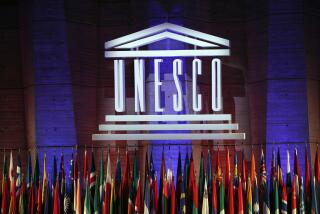37 Nations Vote to Ban Dumping of Nuclear Waste in Oceans
- Share via
LONDON — The United States and 36 other nations voted Friday to permanently bar the dumping of nuclear waste at sea, but four major atomic powers abstained and it was unclear if they would observe the ban.
The ban covers the 71 countries that signed the 1972 London Convention, which regulates the dumping of nuclear waste and other substances in the ocean, and each has 100 days to opt out.
Despite the uncertainty, Clifton Curtis, an adviser to the environmental group Greenpeace International, called the vote “a major step forward by the world community in making a commitment to protect the world’s seas.”
The ban replaces a voluntary moratorium on the dumping of low-level nuclear waste that has been in effect since 1983. The delegates also decided that within 25 years a study will be made to review radioactive waste dumping at sea.
Dick Trump of the Netherlands, chairman of the meeting, said the vote capped a 10-year effort to institute a global ban and is important even if the result was not unanimous.
Japan and Ukraine joined the United States in adopting the ban, and there were no votes against it. Belgium and the four other nuclear powers--Britain, France, Russia and China--abstained. There was no immediate indication whether the abstainers would opt out.
Most attention focused on Russia, which put nuclear dumping in the headlines last month when Greenpeace caught it discharging 237,000 gallons of low-level liquid nuclear waste into the Sea of Japan.
Russia’s environment minister, Victor Danilov-Danilyan, told the meeting that Russia might need to carry out “one or two dumpings” until it builds land-based waste storage facilities. He said Russia could halt dumping by the end of 1994 if it got enough international help.
On Friday, delegates called on nations to help Russia build such facilities.
More to Read
Sign up for Essential California
The most important California stories and recommendations in your inbox every morning.
You may occasionally receive promotional content from the Los Angeles Times.













